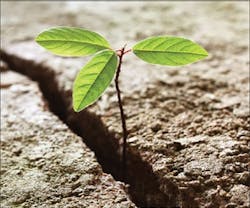Recycled Wastewater May Assist Plant Growth
Two new studies indicate that domestic plants may thrive on reclaimed or recycled water.
A research team from Texas A&M University tested the salt tolerance of 10 common plant species to determine if using recycled water for irrigation could harm plant growth, as the water can contain high levels of salt even after basic treatment.
The ornamental pepper Black Pearl was most sensitive to salt stress, with the other bedding plant species and cultivars showing differing degrees of salt tolerance. The plants rated moderately tolerant to salt overall, and their stress response to the salt could be mitigated by using salt-tolerant bedding, the researchers note.
Some herbaceous perennials, groundcovers, floricultural crops, and landscape woody shrubs simply became more compact when treated with saline solution, indicating that growers may need to prune ornamentals less or cut back on their use of growth regulators if using high-salt recycled water.
Similarly, recycled kitchen water may also offer irrigation alternatives, according to a new report in the International Journal of Environmental Technology and Management. Researchers from the Council of Scientific and Industrial Research in Kolkata, India, discovered that even the worst-performing filtration systems can produce water clean enough for horticultural or agricultural use.
Domestic wastewater may contain organic waste from food processing and utensil washing and residue from soap or detergents, the researchers say. Multichannel tubular ceramic membranes performed better than single-channel filters at cleaning up the dirty dishwater. Microfiltration of the water and the addition of an adsorptive treatment based on the prepared dried roots of the aquatic weed Eichhornia crassipes were most effective, removing 98% of the biological oxygen demand in the water and 99% of chemical oxygen demand.
The two studies offer promising results for arid regions and areas where bedding plant production is vital to the local economy. Using recycled or reclaimed water helps conserve the supply of potable water for drinking.
